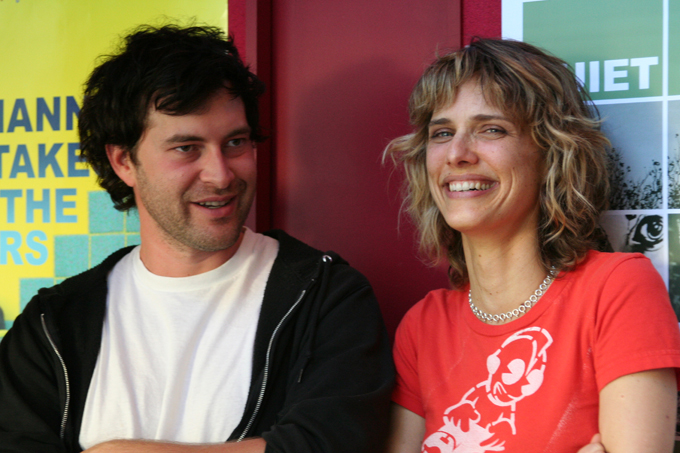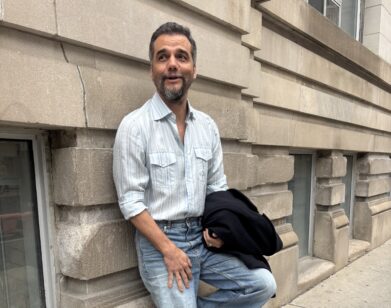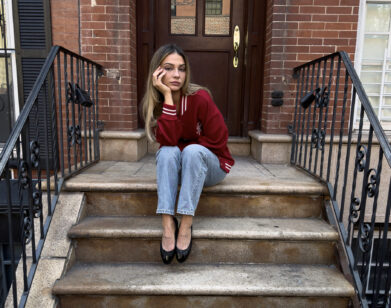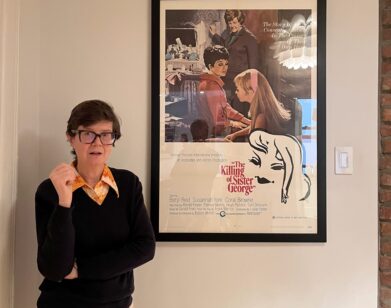Director Lynn Shelton on Getting Over the Hump

Experimental-turned-narrative filmmaker Lynn Shelton makes the films she wants to make with the people she wants to make them with. A Seattle native who studied acting, painting, and photography, Lynn has spent the last decade with experimental and documentary filmmaking. In her most recent two films—My Effortless Brilliance, a drama about a novelist trying to mend a friendship with his oldest friend; and her latest, Humpday, a bromantic comedy set in Seattle about two best friends who resolve to film themselves having sex for a local porn festival—Shelton holds on to her experimental roots and instead of a script, uses a sketched out story where the actors improvise the dialogue.
ADAM SHULMAN: So tell me about the inception of Humpday. You approach your films in a very particular way.
LYNN SHELTON: Well, I started to fantasize about having a completely actor-centered set and thinking about how I would achieve that. I decided to start with a person I wanted to work with and I custom built a character just for them and invite them into that process so it would be a really easy, natural thing. With Humpday, that was Mark Duplass, who plays Ben. He was the starting point.
AS: He’s incredible in the film.
LS: Isn’t he? He’s so great. After Mark I quickly put the list of other things into place: cutting it down to the bare number of people that you need to have on set; taking away most of the equipment; really trying to supplement natural light instead of having a lot of artificial light; having two cameras; and then instead of a traditional script, having a structured outline so that the actors are given the freedom to come up with the actual words.
AS: At one point, Ben and Andrew (Mark Duplass and Josh Leonard) are in a closet—or a basement, although it feels like a closet—and Andrew says he feels like a fraud because he has never finished anything. I think will speak to a lot of people who watch this film. I know so many people feel like Andrew does. Sometimes you start something, a project, a relationship, whatever it might be, but you just don’t know how to carry it through to the end.
Mark Duplass and Lynn Shelton
LS: It’s so fascinating to see what resonates with people. I mean I think you’re actually the first person that’s made that point specifically! [LAUGHS] But it’s really true! And film-making itself is such a good example of that, because it’s such a huge undertaking but the technology is such that anyone can make a film.
AS: Anyone can make one. Anyone can put it up on YouTube.
LS: There’s no excuse not to! I love the democratization of that.
AS: Looking back at the way the plot developed, how does the film resonate in your own life?
LS: Well, the starting point was what I pitched to Mark when I came to him and said, “How about this movie?” We had already met and we decided we wanted to work together, but he was like, “Come up with an idea, Shelton!”
AS: [LAUGHS]
LS: As we moved forward, all these layers began to emerge. But it started out simply: Two straight guys, who were going to try to have sex with each other. And it was this juxtaposition of straight guys and gayness-seeing what would happen if you put these two people together. It was essential that their decision to sleep with one another wasn’t precipitated by anything outside themselves. What if they were two friends, who wanted to reconnect emotionally? What if they really want to try and recapture an intense connection they had as buddies in college? They end up just trying to outdo each other. I thought it might provide interesting opportunities to explore masculinity, and the nature of sexuality and choice.
AS: In bed, two lead characters discuss the fact that they could have chosen any project to pursue together.
LS: The idea of “breaking out” became extremely important for Ben. He is at a point in his life where he’s looking at himself and saying, “What have I created?” And then with Andrew, when he enters you can see that Ben is two different people with his friend and with his wife.
AS: He just can’t settle.
LS: I love that too, how we shift over time. How we can be different with different people? There’s a montage in the film right after the basement scene where you’re looking at little details of his house. And my idea there was to sort of show the externalization of his relationship and his life with his wife-how they’ve carefully constructed this world; showing both the fragility of it but also the very conscious and careful construction of it. You wake up one day and you realize that all these years have gone by and I have this mortgage and I have this couch and I have this life and … is this going to be my prison?
AS: And then do you have another film that you were thinking about working on?
LS: Yeah I have a local film; it actually stars Sherman Alexie, a novelist who lives in Seattle. And it’s modeled on My Dinner with Andre.
AS: Oh nice, I love that movie.
LS: Yeah, not that it’s actually a remake or anything. It’s just the same …
AS: Script.
LS: [LAUGHING] Yeah, ideas. Word for word.
AS: Do you have any plans to intersect with Hollywood?
LS: I never had that ambition and I never thought I’d have any opportunity to. But now that it looks like it is an option…
AS: If the right thing came along?
LS: Yeah, that’s it. It really has to be the right fit. I mean people who seem to really get me.






